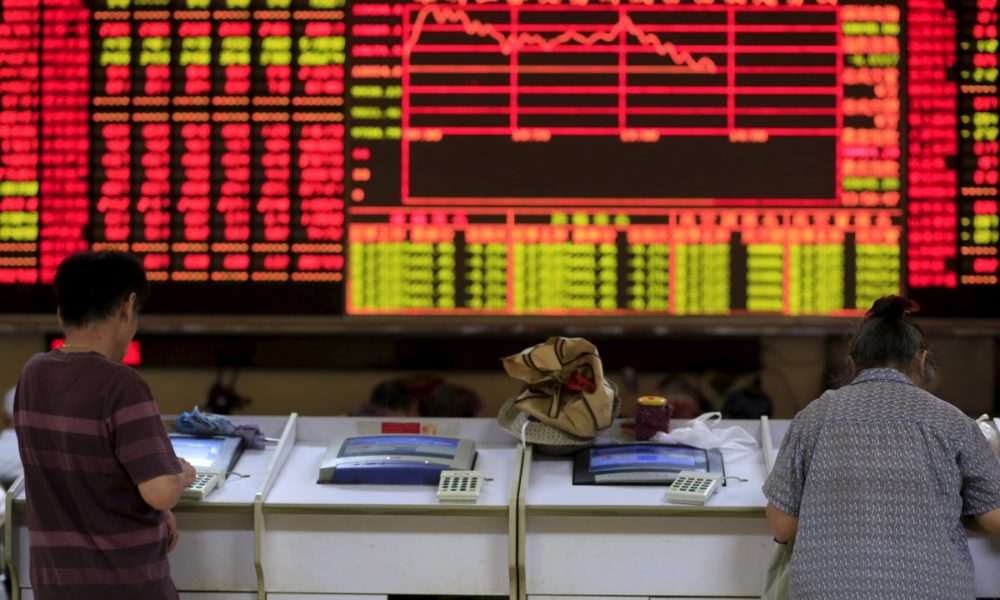Markets
Asian Shares Rise as Upbeat U.S. Jobs Data Offsets Trade Worries

- Asian Shares Rise as Upbeat U.S. Jobs Data Offsets Trade Worries
Asian shares rose to their highest in two-and-a-half-weeks on Monday as strong U.S. jobs data offset worries that tariff wars between the United States and the rest of the world could retard global economic growth.
MSCI’s broadest index of Asia-Pacific shares outside Japan gained 1.0 percent to a high last seen on May 17, while Japan’s Nikkei rose 1.3 percent.
Tech names such as Tencent and Taiwan Semiconductor Manufacturing were among the biggest gainers.
European stocks are seen rising, with spread-betters expecting Britain’s FTSE and Germany’s Dax to gain 0.3 percent and France’s Cac 0.4 percent.
On Wall Street on Friday, U.S. tech shares soared, pushing up the Nasdaq Composite 1.51 percent to 7,554 points, near its record closing high of 7,588 struck in March.
In contrast, the S&P 500, which rose 1.08 percent on Friday, was still about 140 points off a record peak of 2,872 set in January due to concerns over trade frictions.
Finance leaders of the closest U.S. allies vented anger over the Trump administration’s metal import tariffs on Saturday, setting the tone for a heated G7 summit next week in Quebec.
In a rare show of division among the normally harmonious club of wealthy nations, six G7 member countries issued a statement asking U.S. Treasury Secretary Steven Mnuchin to convey their “unanimous concern and disappointment” to President Donald Trump.
“The G7 is showing more divisions than unity, to the point where one has to wonder whether it is worth holding meetings,” said Norihiro Fujito, senior investment strategist at Mitsubishi UFJ Morgan Stanley Securities.
“The G7 summit this weekend could be equally terrible. There’s even talk that Trump may not go. Concerns on trade frictions are likely to continue to weigh on markets,” he added.
There appears to have been no major break-through on trade disputes after U.S. Commerce Secretary Wilbur Ross met Chinese Vice Premier Liu He, either.
China warned the United States on Sunday that any agreements reached on trade and business between the two countries will be void if Washington implements tariffs and other trade measures, as the two ended their latest round of talks in Beijing.
Still, the U.S. economy’s current strength kept bears at bay for the moment.
Data released on Friday showed U.S. job growth accelerated in May and the unemployment rate dropped to an 18-year low of 3.8 percent, indicating a rapidly tightening labour market, which could eventually fuel inflation.
“We had strong headline figures on employment but rise in wages was still well-contained and did not point to a sharp acceleration in inflation,” Hirokazu Kabeya, chief global strategist at Daiwa Securities.
Average hourly earnings rose eight cents, or 0.3 percent last month after edging up 0.1 percent in April. That pushed the annual increase in average hourly earnings to 2.7 percent from 2.6 percent in April.
The strong employment report added to a string of upbeat economic data, including consumer spending, industrial production and construction spending.
They have suggested economic growth was regaining speed early in the second quarter after expanding at a moderate 2.2 percent annualised rate in the January-March period.
Given the strength, the Federal Reserve is all but certain to raise interest rates at its policy meeting next week.
That supported the dollar against other currencies.
The U.S. currency traded at 109.50 yen, having gained 0.6 percent on Friday, extending its rebound from Tuesday’s low of 108.115, its lowest level in over five weeks.
The euro traded at $1.1665, off Thursday’s high of $1.1725. Still, it kept some distance from Tuesday’s 10-month low of $1.1510 as concerns over Italy’s political crisis have eased.
U.S. crude futures fell as low as $65.51 per barrel on Friday, touching their lowest level in almost two months. Rising U.S. crude production and a glut trapped inland due to a lack of pipeline capacity have pressured prices.
U.S. crude futures last traded at $65.71, down 0.15 percent. Global benchmark Brent was down 0.44 percent, at $76.45.